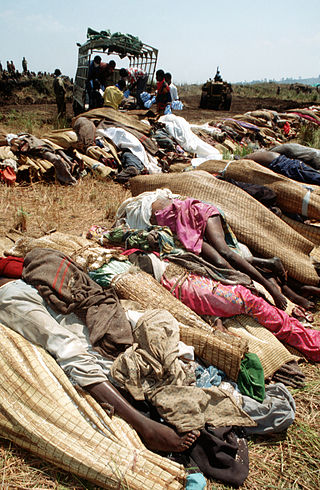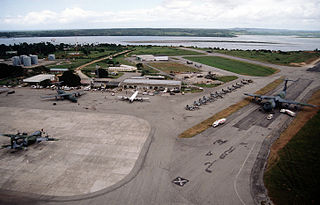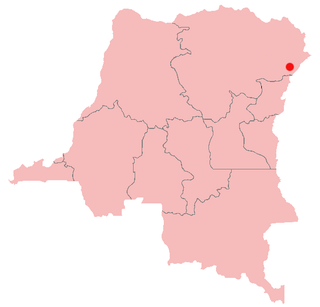
United Nations Security Council resolution 940, adopted on 31 July 1994, after recalling resolutions 841 (1993), 861 (1993), 862 (1993), 867 (1993), 873 (1993), 875 (1993), 905 (1994), 917 (1994) and 933 (1994), the Council permitted a United States-led force to restore President Jean-Bertrand Aristide and authorities of the Government of Haiti, and extended the mandate of the United Nations Mission in Haiti (UNMIH) for an additional six months.

Opération Turquoise was a French-led military operation in Rwanda in 1994 under the mandate of the United Nations. The "multilateral" force consisted of 2,500 troops, 32 from Senegal and the rest French. The equipment included 100 APCs, 10 helicopters, a battery of 120 mm mortars, 4 Jaguar fighter bombers, 8 Mirage fighters, and reconnaissance aircraft. The helicopters laid a trail of food, water and medicine enabling refugees to escape into eastern Zaire. Opération Turquoise is controversial for at least two reasons: accusations that it was an attempt to prop up the genocidal Hutu regime, and that its mandate undermined the UNAMIR. By facilitating 2 million Rwandan refugees to travel to Kivu provinces in Zaire, Turquoise setup the causes of the First Congo War.

The Great Lakes refugee crisis is the common name for the situation beginning with the exodus in April 1994 of over two million Rwandans to neighboring countries of the Great Lakes region of Africa in the aftermath of the Rwandan genocide. Many of the refugees were Hutu fleeing the predominantly Tutsi Rwandan Patriotic Front (RPF), which had gained control of the country at the end of the genocide. However, the humanitarian relief effort was vastly compromised by the presence among the refugees of many of the Interahamwe and government officials who carried out the genocide, who used the refugee camps as bases to launch attacks against the new government led by Paul Kagame. The camps in Zaire became particularly politicized and militarized. The knowledge that humanitarian aid was being diverted to further the aims of the genocidaires led many humanitarian organizations to withdraw their assistance. The conflict escalated until the start of the First Congo War in 1996, when RPF-supported rebels invaded Zaire and sought to repatriate the refugees. The conflict escalated again with the start of the Second Congo War, also called Africa's World War or the Great War of Africa, that began in 1998 when the Congolese president Laurent-Désiré Kabila turned against his former allies from Rwanda and Uganda. The conflict continues with the Kivu conflict that started in 2004 with the start of the M23 rebellion that started in 2012 and still continues today.

United Nations Security Council resolution 812, adopted unanimously on 12 March 1993, after expressing its alarm at the humanitarian situation in Rwanda due to the ongoing civil war, in particular the number of refugees and displaced persons which posed an international threat to peace and security, the Council called upon the Government of Rwanda, the National Republican Movement for Democracy and Development, and the Rwandan Patriotic Front to respect a ceasefire that took place on 9 March 1993 and implement other agreements they had committed themselves to. It was the first resolution on the situation in Rwanda.

United Nations Security Council resolution 918 was adopted without a vote on 17 May 1994. After reaffirming all resolutions on the situation in Rwanda, particularly resolutions 872 (1993), 909 (1994) and 912 (1994), the Council expressed its alarm and condemnation at the continuing large-scale violence, and went on to impose an arms embargo on the country and authorise an expansion of the United Nations Assistance Mission for Rwanda (UNAMIR).

United Nations Security Council resolution 925, adopted unanimously on 8 June 1994, after reaffirming all resolutions on the situation in Rwanda, particularly resolutions 912 (1994) and 918 (1994), and Resolution 868 (1993) on the safety of United Nations peacekeepers, the council deployed additional battalions and extended the mandate of the United Nations Assistance Mission for Rwanda (UNAMIR) until 9 December 1994.

United Nations Security Council resolution 929, adopted on 22 June 1994, after recalling all resolutions on Rwanda, including 912 (1994), 918 (1994) and 925 (1994), the council authorised, under Chapter VII of the United Nations Charter, the temporary establishment of a multinational operation in the country to assist in humanitarian efforts and protect refugees and displaced people, until the full deployment of the expanded United Nations Assistance Mission for Rwanda (UNAMIR).

United Nations Security Council resolution 965, adopted unanimously on 30 November 1994, after reaffirming all resolutions on the situation in Rwanda, particularly resolutions 872 (1993), 912 (1994), 918 (1994), 925 (1994) and 955 (1994), the Council extended the mandate of the United Nations Assistance Mission for Rwanda (UNAMIR) until 9 June 1995 and expanded its operations.

United Nations Security Council resolution 978, adopted unanimously on 27 February 1995, after recalling all previous resolutions on Rwanda, including 935 (1994) and 955 (1994), the Council instructed Member States on the arrest and detention of persons responsible for acts during the Rwandan genocide, within the jurisdiction of the International Criminal Tribunal for Rwanda (ICTR).

United Nations Security Council resolution 997, adopted unanimously on 9 June 1995, after reaffirming all resolutions on the situation in Rwanda, particularly resolutions 872 (1993), 912 (1994), 918 (1994), 925 (1994), 955 (1994) and 965 (1994), the Council extended the mandate of the United Nations Assistance Mission for Rwanda (UNAMIR) until 8 December 1995 and adjusted its operations from peacekeeping to confidence-building.

United Nations Security Council resolution 1011, adopted unanimously on 16 August 1995, after recalling resolutions 918 (1994), 997 (1995) and 1005 (1995) on the situation in Rwanda, the Council suspended the arms embargo against the Government of Rwanda.

United Nations Security Council resolution 1013, adopted unanimously on 7 September 1995, after recalling resolutions 918 (1994), 997 (1995) and 1011 (1995) on the situation in Rwanda, established an international commission of inquiry concerning arms flows to former Rwandan government forces in the Great Lakes region of Africa.

United Nations Security Council resolution 1037, adopted unanimously on 15 January 1996, after recalling previous resolutions on Croatia including resolutions 1023 (1995) and 1025 (1995), the council established the United Nations Transitional Authority for Eastern Slavonia, Baranja and Western Syrmia (UNTAES) for an initial period of 12 months.

United Nations Security Council resolution 1049, adopted unanimously on 5 March 1996, after reaffirming Resolution 1040 (1996) concerning Burundi, the Council called for an end to violence in the country and discussed preparations for a conference on security in the African Great Lakes region.

United Nations Security Council resolution 1050, adopted unanimously on 8 March 1996, after recalling all previous resolutions on Rwanda, the Council discussed arrangements for the withdrawal of the United Nations Assistance Mission for Rwanda (UNAMIR).

United Nations Security Council resolution 1053, adopted unanimously on 23 April 1996, after recalling all previous resolutions on Rwanda, particularly resolutions 918 (1994), 997 (1995), 1011 (1995) and 1013 (1995), the Council reviewed the findings of the Commission of Inquiry concerning violations of the arms embargo against former Rwandan government forces.

United Nations Security Council resolution 1078, adopted unanimously on 9 November 1996, after expressing concern at the situation in the African Great Lakes region, the Council discussed proposals for a regional conference on security and a multinational humanitarian force in eastern Zaire.

United Nations Security Council resolution 1097, adopted unanimously on 18 February 1997, after expressing concern over the situation in the African Great Lakes region and for the safety of refugees and displaced persons, the Council endorsed a five-point peace plan to address the situation in eastern Zaire.

United Nations Security Council resolution 1161, adopted unanimously on 9 April 1998, after recalling all previous resolutions on Rwanda, particularly resolutions 918 (1994), 997 (1995), 1011 (1995), 1013 (1995) and 1053 (1996), the Council reactivated the Commission of Inquiry concerning violations of the arms embargo against former Rwandan government forces.

United Nations Security Council Resolution 1484, adopted unanimously on 30 May 2003, after recalling previous resolutions on the situation in the Democratic Republic of the Congo, the Council authorised Operation Artemis in Bunia, the capital of Ituri Province, amid the deteriorating security situation in the area.

















